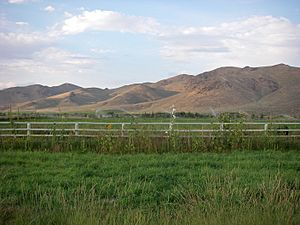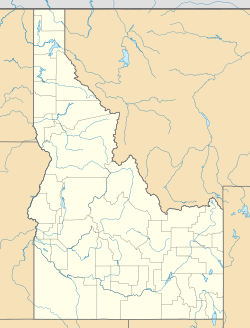Picabo, Idaho facts for kids
Quick facts for kids
Picabo, Idaho
|
|
|---|---|
|
Community
|
|

Hills, mountains, and irrigated fields of Picabo
|
|
| Country | United States |
| State | |
| County | Blaine County |
| Physiographic region | Snake River Plain |
| Area | |
| • Total | 40.0 sq mi (103.5 km2) |
| Elevation | 4,839 ft (1,475 m) |
| Population
(2000)
|
|
| • Total | 128 |
| • Density | 3.203/sq mi (1.237/km2) |
| Time zone | UTC-7 (Mountain Standard Time (MST)) |
| • Summer (DST) | UTC-6 (Mountain Daylight Time (MDT)) |
| Postal code |
83348
|
| Area codes | 208, 986 |
Picabo (pronounced PEE-kuh-boo) is a small, unincorporated community in Blaine County, Idaho, United States. An unincorporated community is a place that doesn't have its own local government. Instead, it's part of a larger county or region.
About Picabo

Picabo is located along U.S. Route 20. It is about 6 kilometers (4 miles) west of Carey. It's also about 19 kilometers (12 miles) southeast of Hailey. You can find a gas station, a country store, a post office, and a small airport here.
The community is surrounded by large ranches. You will also see many fields that are watered by irrigation. In the year 2000, about 128 people lived in Picabo. They lived in 56 homes across an area of about 104 square kilometers (40 square miles).
Picabo is about 56 kilometers (35 miles) north of the Snake River. It sits on the northern edge of the Snake River Plain. This is a flat area that cuts through the mountains of southern Idaho.
Silver Creek
The nearest flowing stream is Silver Creek. This beautiful stream is fed by natural springs. It flows into the Little Wood River. Silver Creek is very important for watering farms in eastern Blaine County.
Silver Creek is famous among people who love to fish with flies. The famous writer Ernest Hemingway enjoyed hunting and fishing along this stream. He often went with a local rancher named Bud Purdy.
The Name Picabo
The name "Picabo" is thought to come from a Native American word. This word means "silver water." This makes sense because of the nearby Silver Creek.
The name "Picabo" became well-known because of Picabo Street. She is an Olympic skier who grew up in a nearby town called Triumph.
Climate in Picabo
Picabo has a type of climate with warm summers. It also has cold winters. The hottest temperature ever recorded in Picabo was 39 degrees Celsius (102 degrees Fahrenheit). This happened on July 17, 1998, and again on July 11, 2002. The coldest temperature ever recorded was -38 degrees Celsius (-37 degrees Fahrenheit). This very cold day was on December 23, 1990.
 | Sharif Bey |
 | Hale Woodruff |
 | Richmond Barthé |
 | Purvis Young |



